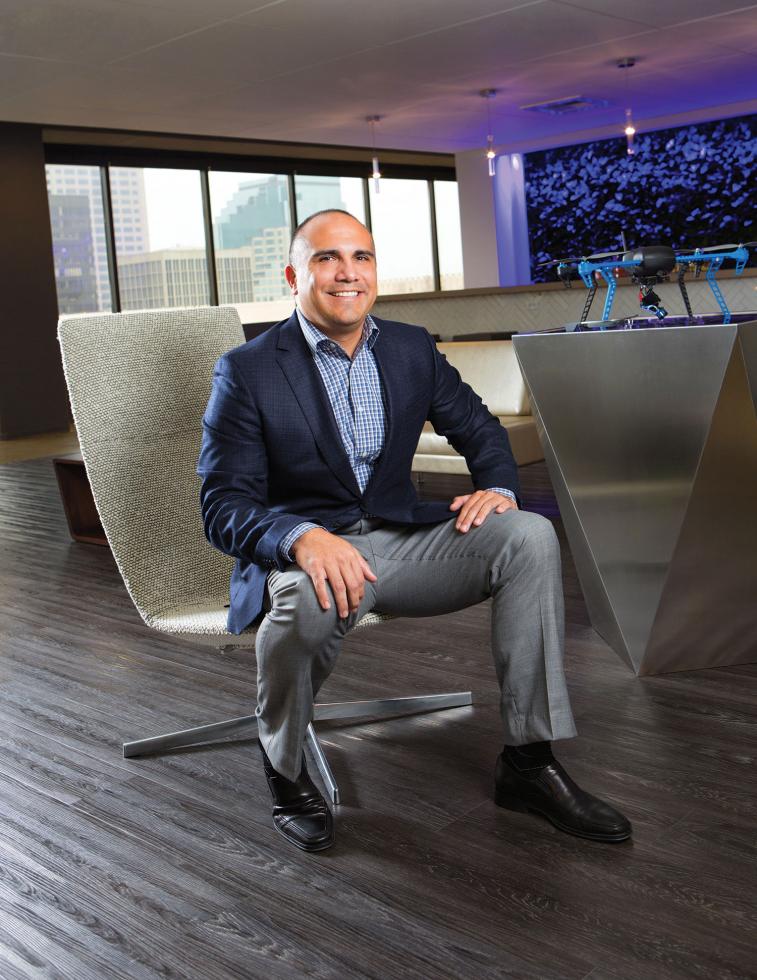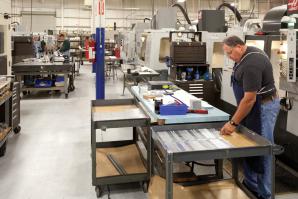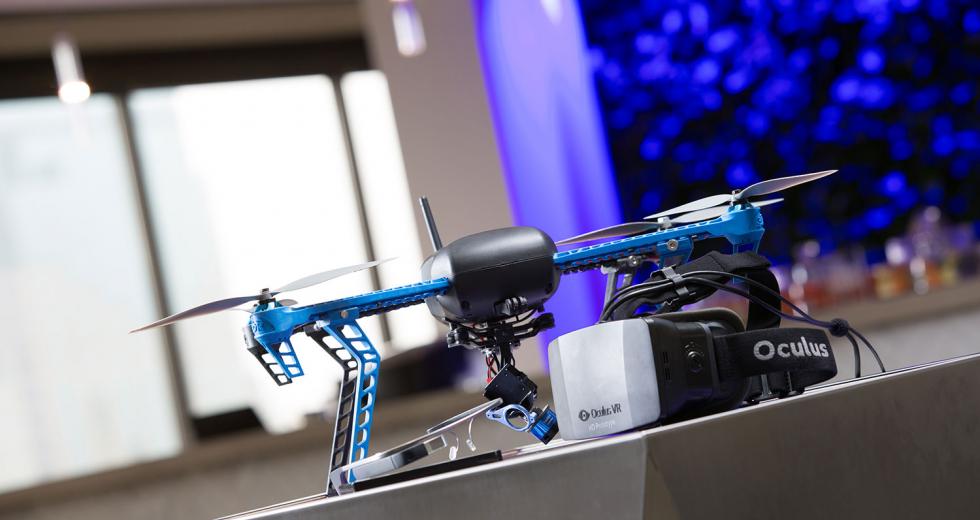Ryan Montoya’s task is clear, straightforward and possibly, well, impossible: Turn the Sacramento Kings into the most technologically adept sports franchise in the world.
Under its current tech-genius ownership and on the cusp of a new, state-of-the-art arena, the Kings will settle for nothing less than inventing a new way to deliver a quality fan experience, cutting-edge player evaluations and a host of other ways to integrate the NBA into the digital world. The bar — and the stakes — are high, so Montoya and other Kings staffers deflect pointed questions about their tech strategies with a vague, “just wait, you’ll see” armor of secrecy. We are the curious children; Montoya will not allow us to spoil the delight of our own surprise.
Another way of looking at it: Ryan Montoya has been assigned the job of making the Kings’ new downtown arena into a sleek, high-performance, 17,500-seat computer. His official title is senior vice president of strategy, innovation and technology, and he works directly with team lead owner Vivek Ranadivé and the rest of the ownership group.
Ryan Montoya, senior vice president of strategy, innovation and
technology for the Sacramento Kings, has one goal: Build the
planet’s most tech-savvy sports franchise.

“I work for the smartest tech guys in the world,” he says. “The ownership of this organization is the most tech-savvy anywhere. You’d be amazed by the emails I get.”
Ranadivé earned graduate degrees from MIT and Harvard, founded and ran TIBCO, a real-time computing company that transformed the use of data on Wall Street (he sold TIBCO in September for $4.3 billion), and published three New York Times bestsellers on, among other things, the use of real-time technology to anticipate customers’ needs and capture new opportunities.
So hey, no pressure, Montoya.
If he feels the heat, Montoya doesn’t let on. He comes across as calm, easy-going and very smart. With a bachelor’s from Notre Dame, a master’s from University of Denver and a background advising early-stage high-tech companies, he’s now the guy in charge of technology for the Kings — a man too busy to worry. He’s putting all of his attention to custom-tailoring the fan experience in both the current and future arenas and finding the latest ways to acquire data to analyze player performance and potential.
The pedigree of the ownership and operations staff already assembled has made it easy, he says, to attract the best of the best.
“I’m amazed by the quality of talent in Sacramento today,” he says. “There’s no scarcity for us. Our team is on a winning streak.”
Montoya points to the Kings’ September hiring of NBA analytics guru Dean Oliver, who has crunched data for the Denver Nuggets and ESPN. Oliver is an originator of the use of sophisticated statistics to evaluate performance of NBA athletes and coaches. The method, dubbed APBRmetrics (Association for Professional Basketball Research), uses data to gain insights.
For example, Oliver measures a team by how many points per 100 possessions they score and allow (also called offensive and defensive ratings), he notes how a team’s performance fares when a particular player is on the floor and counts exactly how many times a player passes the ball when defended by more than one opponent.
Oliver, who has a doctorate in engineering from MIT, is author of the 2004 book Basketball on Paper: Rules and Tools for Performance Analysis. He should fit right in with Ranadive and the rest of the folks in the front office.
Using new developments, possibly including Sportsvu, which uses israeli missile tracking technology and small cameras to follow players around the court, fans will have play-by play data delivered to their devices within 90 seconds.
At the press conference introducing Oliver, Kings General Manager Pete D’Alessandro noted his ability to “take something complicated and break it down to three or four simple points.”
Oliver responded that he has a “lot of years translating words into numbers and back.” Players and coaches are getting used to data analysis as a way of coaching for best performance, he said. “There’s more and more information, and you’ve got players who want every detail they can get. We want to be able to help those guys.”
Over at the bustling construction site between J and L streets in downtown Sacramento, the bones of the Kings new $477 million facililty are being assembled. Some of the technology that will be installed in the finished structure are known, but quite a few are being kept secret.
No one is saying whether the Kings are one of the NBA teams using Optim-Eye, a device from Australian company Catapult Sports that players can wear on their back during practice to measure distance, speed, acceleration, deceleration, jump height and heart rate. This biometric data can be analyzed by coaches and players to measure performance and development.
But you can be sure the Kings are at the leading edge of such tech toys. The Kings tech team has a 2-year window before it will unveil the array of cutting-edge goodies at what Montoya calls the “world’s smartest arena.” In the meantime, it’s using the Kings’ current home, Sleep Train Arena, as a testing site.
“We have an innovation lab tucked away (there),” Montoya says. “We keep up with the newest innovations and have a dialogue every day about it.”
He says the technology team at Sleep Train Arena tries out “lots of things” (on a limited scale because the building is old). Many of those “things” don’t make the cut, Montoya says, but testing out every good idea allows for the occasional breakthrough.
The Kings were the first U.S. professional sports team to invite players and fans to try out Google Glass wearable technology, to accept the digital currency Bitcoin for purchases and to allow camera-laden drones to zip around the arena.
“I work for the smartest tech guys in the world. You’d be amazed by the emails I get.” Ryan Montoya, senior vice president of strategy, innovation and technology, Sacramento Kings
After each of those “firsts,” Montoya says, the phones lit up as other teams called to find out how the Kings had done it — and immediately copy them. The attention gained worldwide has served to seal the Kings’ reputation as the organization where high-tech happens, but it’s also created a new environment of protective secrecy.
All that global notice has established for the Kings a solid and growing base of fans from Bangalore to Barcelona. But while Montoya does scan the world to seek out the industry’s best tech thinkers and futurists for their ideas, he keeps in mind some of the best ideas will come from a source much closer to home: the people in the seats at Sleep Train.
“We listen to our fans,” he says. “You can do all the analytics, use fast data, but if a fan has a great experience, that is the best information to have.”
Testing at the arena helps make sure everything’s in place for fans to have a good time, and when they do, to make it easy to spread the word to others using social media.
“We’ll keep the unpleasant from happening,” he says. “We want to customize the experience — from ticketing to real-time transactions.”
Part of that experience will begin with an electronic welcome mat, using one of many Kings apps under development.
“Pull into the lot, tap your phone, and we’ll know you’ve arrived,” he says. “Maybe, if it’s your birthday, we’ll provide something complimentary at the snack bar.” Only a couple of cards showing, but Montoya’s not going to play his hand too early.
The focus, Montoya says, is using technology to enhance experience. There’s even an acronym attached to all of it: SMAC — social, mobile, analytics, cloud.
“We have a blank slate at the new arena,” Montoya says, “but the challenge is we have a short time-frame.” Technology advances so quickly that planning now for what will exist in two years involves strategic guessing. Montoya says “bandwidth and connectivity” are essential to keeping up with and allowing for yet-unknown advances.
The arena won’t open until fall 2016, but thanks to technology, fans can preview the building at the Kings Experience Center on J Street downtown. If visitors want to view a luxury suite (which, by the way, they will be able to control with their mobile devices to adjust lighting, order concessions, etc.) they can put on an Oculus Rift headset and blend digitally into an eerily perfect augmented reality.
The attention gained worldwide has served to seal the Kings’ reputation as the organization where high-tech happens, but it’s also created a new environment of protective secrecy.
The new arena will “listen, speak and interact with you,” Montoya says. Fans with the Kings mobile app will be able to immediately stream replays from various angles, use their device to purchase food, drinks and souvenirs, even connect with friends around the arena.
Using new developments, possibly including SportsVu, which uses Israeli missile-tracking technology and small cameras to follow players around the court, fans will have play-by-play data delivered to their devices within 90 seconds. (Teams will get a much deeper set of metrics.)
Whatever it is, the experience, Montoya says, must be “seamless.”
And it must be safe.
Much of the tech at the arena will be cloud-based, but fans need to feel sure their privacy is protected. Montoya says security is “the number one priority for us. We will keep the environment secure, but still innovate.”
Innovation is the main part of his job, after all. So is working for people who will never settle for second-best. That means Ryan Montoya will read yet another middle-of-the-night email in which his boss inquires about some new innovation or offers a breakthrough idea. And the next morning Ryan Montoya will wake up early, get dressed and go to work, pushing relentlessly for another day toward his goal, the only possible outcome: making his team the world champs of tech.
Recommended For You

Crown of Innovation
The Sacramento Kings make geek chic
The technology website GeekWire calls the Sacramento Kings the “NBA’s most geeky franchise.” They mean it as a compliment. Here are some of the ways the Kings are maintaining their edge.

Status Check: Roseville Sports Complex
Placer Valley Tourism makes progress in large-scale sports development
Last May we reported on the upcoming development of a $30 million, 12-field soccer complex in west Roseville and the addition of five baseball and softball fields in the existing Whitney Park complex in Rocklin. Here’s where things stand:

The Auburn Advantage
How one city turned lifestyle into business leads
Downtown Auburn has a distinct, modern-day Mayberry feel, from the stone-paved sidewalks to the rustic brick bus stop. But five miles away,





Comments
I am a hard of hearing season ticket holder and cannot hear what the announcer says, the PA system is more than loud enough but many people like myself cannot understand what is being said. By captioning the announcer's remarks and showing them on the scoreboard or other screens in the arena would be a great help. I know that other arenas and stadiums do this. Are the Kings including this in their high technology plans? Over 10 percent of the population have hearing issues, and I am sure that because of the demographics of the fans that attend the games that percentage of those with hearing issues is higher. Also many people with normal hearing have problems understanding what the announcers are saying would also be appreciative of the captions.
In short are the Kings goin g to include captioning in the announcer remarks? The games on TV are generally captioned and I sure appreciate that.
Sincerely, W. Michael Keefe